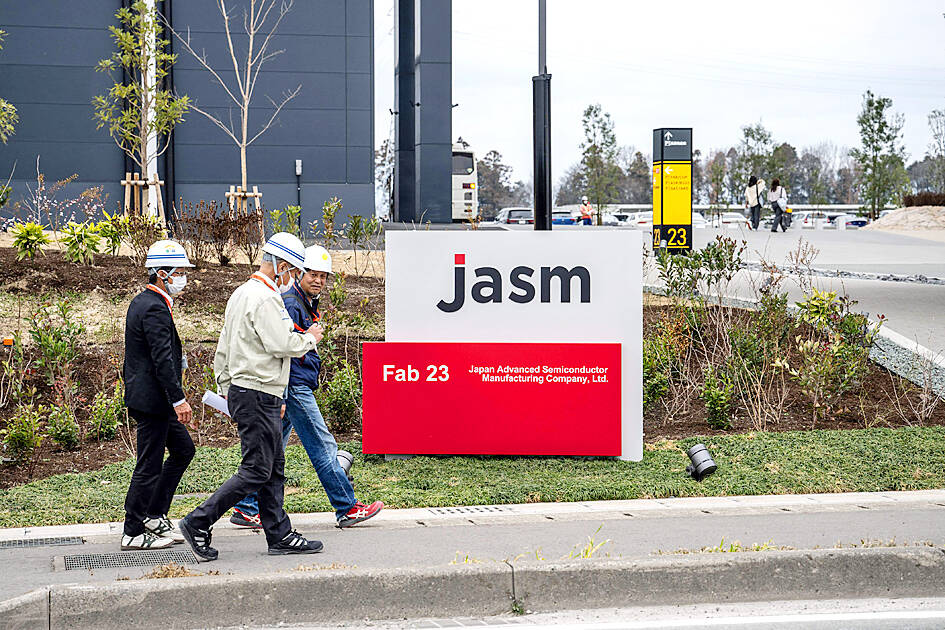Taiwan Semiconductor Manufacturing’s (TSMC, 台積電) first wafer fab in Kumamoto, Japan is still set to launch commercial production in the fourth quarter of this year as planned, the world’s largest contract chipmaker said on Saturday in response to reports that mass production might begin ahead of schedule.
TSMC said the monthly production capacity of the joint venture fab, Japan Advanced Semiconductor Manufacturing (JASM), is expected to hit 55,000 units of 12-inch wafers, using the mature 12-nanometer, 16-nanometer, 22-nanometer and 28-nanometer processes.
JASM is owned by TSMC and its Japanese business partners Sony Semiconductor Solutions Corp and Denso Corp, with the Taiwanese company holding the majority of shares.

Photo: Philip FONG, AFP
TSMC’s remarks came after a local media report said earlier in the day that because Sony is a major CMOS image sensor supplier to Apple Inc, the US consumer electronics giant had been repeatedly urging JASM to mass produce chips ahead of schedule.
The report said the fab began a trial run before the Lunar New Year holiday after it began installing equipment in October 2022. It has been rolling out about 3,000 chips per month and commercial production was expected to start ahead of schedule, the report added.
TSMC founder Morris Chang (張忠謀), Japanese Prime Minister Fumio Kishida and Japan’s Princess Kako are expected to attend the opening ceremony of the Kumamoto fab on Saturday, the report said.
Investment in the fab totaled about ¥1.1 trillion (US$7.32 billion), and the subsidies provided by the Japanese government accounted for almost half of the investment amount, it said.

South Korea’s equity benchmark yesterday crossed a new milestone just a month after surpassing the once-unthinkable 5,000 mark as surging global memory demand powers the country’s biggest chipmakers. The KOSPI advanced as much as 2.6 percent to a record 6,123, with Samsung Electronics Co and SK Hynix Inc each gaining more than 2 percent. With the benchmark now up 45 percent this year, South Korea’s stock market capitalization has also moved past France’s, following last month’s overtaking of Germany’s. Long overlooked by foreign funds, despite being undervalued, South Korean stocks have now emerged as clear winners in the global market. The so-called “artificial intelligence

NEW IDENTITY: Known for its software, India has expanded into hardware, with its semiconductor industry growing from US$38bn in 2023 to US$45bn to US$50bn India on Saturday inaugurated its first semiconductor assembly and test facility, a milestone in the government’s push to reduce dependence on foreign chipmakers and stake a claim in a sector dominated by China. Indian Prime Minister Narendra Modi opened US firm Micron Technology Inc’s semiconductor assembly, test and packaging unit in his home state of Gujarat, hailing the “dawn of a new era” for India’s technology ambitions. “When young Indians look back in the future, they will see this decade as the turning point in our tech future,” Modi told the event, which was broadcast on his YouTube channel. The plant would convert

‘SEISMIC SHIFT’: The researcher forecast there would be about 1.1 billion mobile shipments this year, down from 1.26 billion the prior year and erasing years of gains The global smartphone market is expected to contract 12.9 percent this year due to the unprecedented memorychip shortage, marking “a crisis like no other,” researcher International Data Corp (IDC) said. The new forecast, a dramatic revision down from earlier estimates, gives the latest accounting of the ongoing memory crunch that is affecting every corner of the electronics industry. The demand for advanced memory to power artificial intelligence (AI) tasks has drained global supply until well into next year and jeopardizes the business model of many smartphone makers. IDC forecast about 1.1 billion mobile shipments this year, down from 1.26 billion the prior

People stand in a Pokemon store in Tokyo on Thursday. One of the world highest-grossing franchises is celebrated its 30th anniversary yesterday.